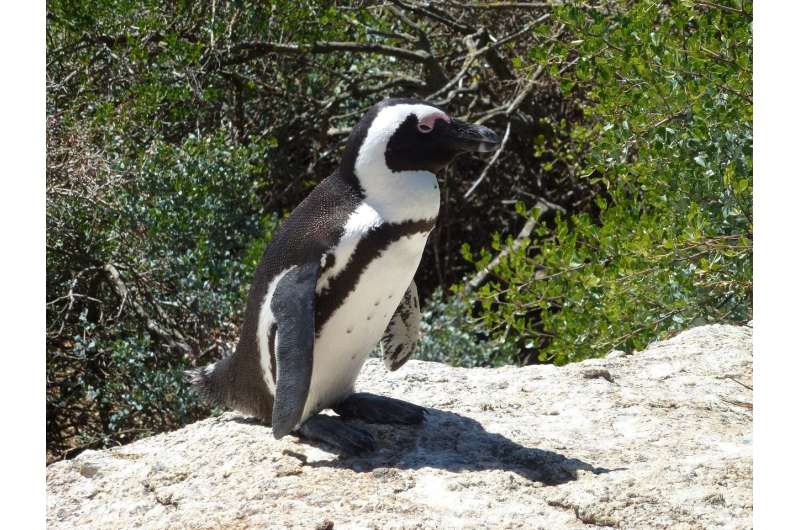September 29, 2017 report
African penguins found to work together to corral fish for foraging

(Phys.org)—A team of researchers affiliated with several institutions in South Africa has found that African penguins sometimes work together to corral fish to allow for more efficient foraging. In their paper published in the journal Royal Society Open Science, the group describes how they studied the birds, what they found and why they believe the penguins might go extinct if something does not change soon.
African penguins live off the southern coast of Africa. Like other penguins, they survive by eating small fish—in this cased, their diet is generally sardines and anchovies. But the African penguins have also been found to engage in a fishing behavior that has never been seen in penguins before—group coordinated foraging.
Noting that the African penguin population has been dwindling due to diminished ocean fisheries over the past several decades, the researchers decided to take a closer look at their feeding habits. They affixed miniature cameras to the backs of 12 of the birds and used the data to create video for review. In all, the team amassed 14 hours of video, which revealed a lot about the life of the penguins.
In addition to footage showing the penguins preening, there was also evidence of how they fished. The researchers report that the birds did their foraging alone approximately 66 percent of the time—the other 33 percent of the time, they worked together as a cohesive unit to usher fish into columns and then into balls. Dolphins have been seen doing the same on many occasions, but this was the first time it has been seen in penguins. Corralling the fish into a ball allows for easier foraging. In watching the video footage, researchers were able to compare the efficiency of fishing alone versus fishing with a group, and found that when the birds fished together, they were more than twice as efficient. The team also found evidence of the birds communicating prior to collaborative foraging, suggesting they planned their assault on their prey.
The researchers note that the population of African penguins has dropped from 4 or 5 million two centuries ago to just 50,000 today, which possibly explains why they coordinate their foraging so seldom despite the near guarantee of more food—there are not always enough of them around to form a large enough group.
More information: Alistair M. McInnes et al. Group foraging increases foraging efficiency in a piscivorous diver, the African penguin, Royal Society Open Science (2017). DOI: 10.1098/rsos.170918
Abstract
Marine piscivores have evolved a variety of morphological and behavioural adaptations, including group foraging, to optimize foraging efficiency when targeting shoaling fish. For penguins that are known to associate at sea and feed on these prey resources, there is nonetheless a lack of empirical evidence to support improved foraging efficiency when foraging with conspecifics. We examined the hunting strategies and foraging performance of breeding African penguins equipped with animal-borne video recorders. Individuals pursued both solitary as well as schooling pelagic fish, and demonstrated independent as well as group foraging behaviour. The most profitable foraging involved herding of fish schools upwards during the ascent phase of a dive where most catches constituted depolarized fish. Catch-per-unit-effort was significantly improved when targeting fish schools as opposed to single fish, especially when foraging in groups. In contrast to more generalist penguin species, African penguins appear to have evolved specialist hunting strategies closely linked to their primary reliance on schooling pelagic fish. The specialist nature of the observed hunting strategies further limits the survival potential of this species if Allee effects reduce group size-related foraging efficiency. This is likely to be exacerbated by diminishing fish stocks due to resource competition and environmental change.
Journal information: Royal Society Open Science
© 2017 Phys.org


















